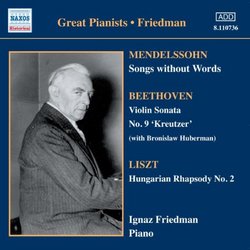| All Artists: Felix [1] Mendelssohn, Ludwig van Beethoven, Franz Liszt, Ignaz Friedman Title: Mendelssohn: Songs without Words; Beethoven: Violin Sonata No. 9 "Kreutzer"; Liszt: Hungarian Rhapsody No. 2 Members Wishing: 0 Total Copies: 0 Label: Naxos Release Date: 7/20/2004 Genre: Classical Styles: Chamber Music, Historical Periods, Classical (c.1770-1830), Modern, 20th, & 21st Century, Instruments, Strings Number of Discs: 1 SwapaCD Credits: 1 UPC: 636943173626 |
Search - Felix [1] Mendelssohn, Ludwig van Beethoven, Franz Liszt :: Mendelssohn: Songs without Words; Beethoven: Violin Sonata No. 9 "Kreutzer"; Liszt: Hungarian Rhapsody No. 2
CD Details |
CD ReviewsDrama, Impetuosity and Glorious Tone: The Grand Style J Scott Morrison | Middlebury VT, USA | 08/04/2004 (5 out of 5 stars) "Ignaz Friedman (1882-1948) was a student of the fabled Theodor Leschetizky (1830-1915) and was even his teaching assistant for a time. Leschetizky's pupils were generally noted for their singing legato tone and Friedman had that in spades. He was also a dramatic, not to say an impetuous, player and that is obvious in his recordings here, made in 1930-31 for English Columbia. The nine selections from Mendelssohn's 'Songs Without Words' are not played as miniatures but as tone poems, an unusual approach in these pieces so beloved, in their day, by piano students. For instance, Op. 67, No. 2 in f sharp minor is a complete drama conveyed in less than two minutes. Friedman was a touring soloist. He almost never played chamber music in public and this recording of Beethoven's 'Kreutzer' Sonata, Op. 47, is the ONLY chamber music recording he ever made. The violinist is Friedman's exact contemporary, the hugely talented Bronislaw Huberman (1882-1947), in his day one of the reigning kings of the instrument. Two takes of the first movement were made and a different version was issued in the US and in Europe. Both are included here. Frankly I hear little difference, although perhaps the second take (included as the first movement of the complete sonata; the first take then follows on a separate track after the sonata has been completed) is a bit more dramatic. Both of these players were huge personalities and yet they were able to collaborate as if on the same wave-length in this performance. It IS an exciting traversal, if a little over the top in the first movement. The performance of the variations movement (II) is possibly the best I've ever heard. The two performers not only breathe together but both players sing as only great instrumentalists can do. I'm not generally fond of violin portamenti, standard in Huberman's day, but they are certainly not intrusive here. The Presto is a romp that threatens to go out of control but never does, making it all the more exciting. Whew! The disc concludes with Friedman playing the Liszt 'Hungarian Rhapsody No. 2,' the most famous of the nineteen Liszt wrote. Again, Friedman's dramatic and impetuous style is in evidence; can you imagine a piece for which this would more appropriate? Lots of rubato, lots of dynamic contrasts, incredible singing tone. And particularly when he gets to the 'friska' it's a real heaven-stormer. I'd never heard this version before and I'm still gaping at it. Frankly, if you love this Hungarian Rhapsody as I do, it would be worth Naxos's budget price for this performance alone! Transfer engineer Ward Marston is responsible for the extremely life-like sound, only slightly noticeable as 70 years old! He had wonderful sound to work with, one must admit; those English Columbias were marvels in their time. Heartily recommended. TT=75:14 Scott Morrison" A large-scale Mendelssohn and the famous Kreutzer -Sonata wi Anton Zimmerling | Moscow, Russia | 12/07/2008 (5 out of 5 stars) "I bought this CD and the whole Friedman series on Naxos only this month, so my impressions are still fresh, but not as deep as by the preceding reviewer. I would rather say that the happiest Friedman's achievement of this CD is 9 `Songs without Words' by Mendelssohn (1930-1931): they are simply stunning, and his playing is natural -- he does not try to show up his superman skills here. It is a pity that he did not record the famous `Spinning Song' in C major.
I have already heard the `Kreutzer' Sonata with the legendary violinist Bronislaw Huberman and Friedman at the piano (1930). I can confirm that this transfer is very clean. I have little to add to Mr. Morrison's exact analysis of the interpretation, except for one tiny point: there is some difference in two takes of the first movement of the Kreutzer Sonata - merely in Huberman's playing. The violinist is playing more dramatically and seems to stand a bit closer to the mike. The accents in the first version are more intense, but the surface is more worn (the first beats of the initial Presto ca 1.43, 3.40-3.47 etc). I prefer the first version musically and the second one acoustically. Hungarian Rhapsody No. 2 (1931) is indeed arresting: Friedman's extraordinary singing tone is evident from the very first bars. But again, his rubato and accents are very mannered. There exist another large-scale contemporary recording of this piece- by another pupil of Leschetizky, Benno Moiseiwitsch. It is available on Naxos Moiseiwitsch series, vol. 2. I suggest that people interested in romantic piano compare these two approaches. Ward Marston who made both Naxos transfers, opted for Moiseiwitsch in his collection of Liszt 19 rhapsodies on VAI: I don't know whether this was done on technical or other reasons. Highly recommended. " |


 Track Listings (14) - Disc #1
Track Listings (14) - Disc #1